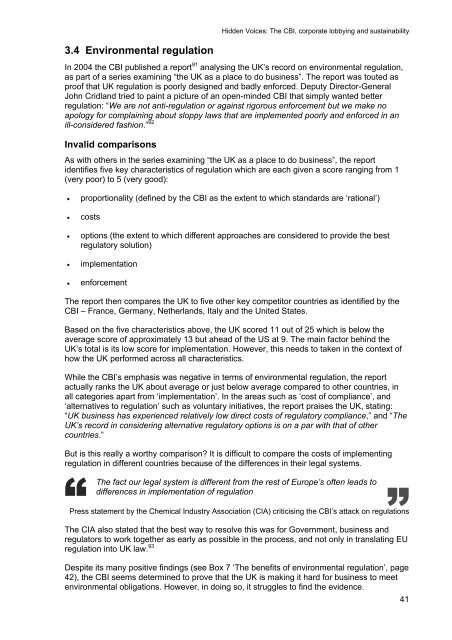hidden_voices
hidden_voices
hidden_voices
You also want an ePaper? Increase the reach of your titles
YUMPU automatically turns print PDFs into web optimized ePapers that Google loves.
Hidden Voices: The CBI, corporate lobbying and sustainability3.4 Environmental regulationIn 2004 the CBI published a report 91 analysing the UK’s record on environmental regulation,as part of a series examining “the UK as a place to do business”. The report was touted asproof that UK regulation is poorly designed and badly enforced. Deputy Director-GeneralJohn Cridland tried to paint a picture of an open-minded CBI that simply wanted betterregulation: “We are not anti-regulation or against rigorous enforcement but we make noapology for complaining about sloppy laws that are implemented poorly and enforced in anill-considered fashion.” 92Invalid comparisonsAs with others in the series examining “the UK as a place to do business”, the reportidentifies five key characteristics of regulation which are each given a score ranging from 1(very poor) to 5 (very good):• proportionality (defined by the CBI as the extent to which standards are ‘rational’)• costs• options (the extent to which different approaches are considered to provide the bestregulatory solution)• implementation• enforcementThe report then compares the UK to five other key competitor countries as identified by theCBI – France, Germany, Netherlands, Italy and the United States.Based on the five characteristics above, the UK scored 11 out of 25 which is below theaverage score of approximately 13 but ahead of the US at 9. The main factor behind theUK’s total is its low score for implementation. However, this needs to taken in the context ofhow the UK performed across all characteristics.While the CBI’s emphasis was negative in terms of environmental regulation, the reportactually ranks the UK about average or just below average compared to other countries, inall categories apart from ‘implementation’. In the areas such as ‘cost of compliance’, and‘alternatives to regulation’ such as voluntary initiatives, the report praises the UK, stating:“UK business has experienced relatively low direct costs of regulatory compliance,” and “TheUK’s record in considering alternative regulatory options is on a par with that of othercountries.”But is this really a worthy comparison? It is difficult to compare the costs of implementingregulation in different countries because of the differences in their legal systems.The fact our legal system is different from the rest of Europe’s often leads todifferences in implementation of regulationPress statement by the Chemical Industry Association (CIA) criticising the CBI’s attack on regulationsThe CIA also stated that the best way to resolve this was for Government, business andregulators to work together as early as possible in the process, and not only in translating EUregulation into UK law. 93Despite its many positive findings (see Box 7 ‘The benefits of environmental regulation’, page42), the CBI seems determined to prove that the UK is making it hard for business to meetenvironmental obligations. However, in doing so, it struggles to find the evidence.41


